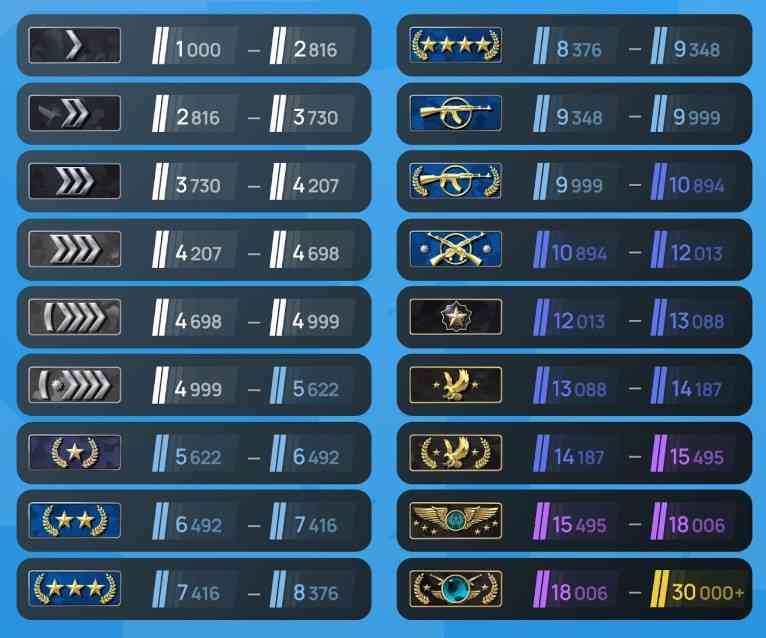Bach Hoa Hang Nga: Your Trusted Source for Quality Products
Explore a wide range of quality products and insightful articles.
CSGO Skill Groups Exposed: The Truth Behind the Numbers
Uncover the hidden truths of CSGO skill groups! Dive into the stats and discover what the numbers really mean for your gameplay.
Understanding CSGO Skill Groups: What the Numbers Really Mean
In Counter-Strike: Global Offensive (CS:GO), skill groups represent your competitive matchmaking rank, helping you gauge your abilities against other players. The skill group system ranges from Silver IV to Global Elite, with each rank containing several divisions. For instance, the Silver I rank is the lowest tier within the Silver skill group, while Global Elite is the highest. Understanding the numbers associated with these skill groups can significantly enhance your gameplay, as they provide insights into your performance and how you can improve.
Each skill group not only indicates your current ranking but also reflects your average performance over a series of matches. For example, players in the Gold IV skill group have established themselves as competent competitors, yet still face challenges from opponents in the Gold III and Gold II groups. Moreover, the number of players in each skill group can fluctuate over time, leading to a dynamic matchmaking experience. Embracing this system and focusing on improving your gameplay can ultimately help you ascend through the skill groups, giving you both a tangible goal and a sense of achievement.

Counter-Strike is a highly popular tactical first-person shooter game that pits teams of terrorists against counter-terrorists. One of the most sought-after weapons in the game is the AWP, particularly the AWP Printstream, known for its distinctive design and powerful capabilities. Players often develop strategies around utilizing this weapon to secure critical map control and eliminate opponents from a distance.
How Skill Groups are Determined in CSGO: A Deep Dive
In Counter-Strike: Global Offensive (CSGO), the determination of skill groups is a complex process that relies on various factors. Players begin their journey by completing ten placement matches, which assess their performance against others in competitive games. Based on these matches, the CSGO matchmaking system employs a skill rating (MMR) that evaluates a player's abilities, taking into account wins, losses, and individual performance metrics such as kills, deaths, and assists. This initial MMR establishes a player's skill group, which ranges from Silver to Global Elite.
Once players are placed in their respective skill groups, the CSGO matchmaking system continuously analyzes their performance in subsequent matches. Factors such as win streaks or losing streaks, the relative skill of opponents, and even the player's impact on the game's outcome can lead to adjustments in their rank. Moreover, the system aims to maintain a balanced and fair environment by pairing players with similar skill levels, ensuring competitive matches and an engaging experience. Over time, players can rise or fall through the ranks as they hone their skills and adapt to the evolving gameplay of CSGO.
Do Skill Groups Accurately Reflect Player Skill in CSGO?
In the competitive landscape of CSGO, the implementation of skill groups has become a central focus for players seeking to gauge their true abilities. However, many players question whether these skill groups accurately reflect their in-game skill level. Factors such as team dynamics, individual player performance, and even the matchmaking algorithm itself can significantly impact a player's experience and perceived skill level. For instance, a player in the Gold IV skill group may frequently encounter teammates and opponents who do not display a consistent level of expertise, leading to frustrating outcomes that bring into question the validity of the skill group ranking system.
Moreover, it is essential to recognize that skill groups are not static and can evolve with a player's performance over time. Players who invest time in improving their gameplay and strategy can see shifts in their rankings, reflecting the growth of their skills. However, the dynamic nature of skill groups also means that a player’s journey can be erratic, with fluctuations that might not always align with their actual skill level. Therefore, while skill groups provide a framework for matchmaking, CSGO players should approach these rankings as a general guideline rather than a definitive measure of their abilities.